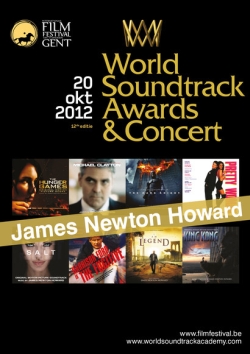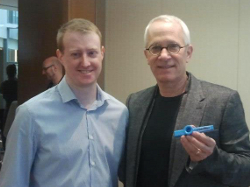interviewJames Newton Howard
During the Film Festival of Ghent, film music fans are always looking forward to the final day. The World Soundtrack Awards bring some of the
biggest names to this cozy city. Present this year were Pino Donaggio, Trevor Morris, Brian Byrne and Alberto Iglesias. This year’s honoree guest was James Newton Howard, the legendary composer of Waterworld, The Sixth Sense, King Kong and many others.
Several years ago he was in Ghent to accept the Composer of the Year award, and that got the attendees of the Meet & Greet very surprised and enthusiast.
This year he was the main attraction. Before the concert we got the chance to talk to him briefly. We realized he's a very warm and kind man loving his profession.
If we can start with the beginning. When you start working on a project, from the moment you sit down with your director until the last recording sessions and mix … Which is for you the most exciting moment of the whole process?
Without question my favourite moment is when I'm alone in my studio and finish writing a piece of music that I think is special, something that really unlocked a key to the movie. That maybe represents some kind of an expansion of my own work, something that is new and has a different approach. That's the purest moment for me. After that other personalities get involved. Then the director comes and says: “well I think you know you did a good job but I don't like it.” There’s a chance I then have to redo it. So the purest moment for me is when I'm alone with the movie and I've done something like that. The next best part is when it's all working really beautifully with the orchestra, when it's all connecting with what's on screen.
What happens when the director says: this is a good piece but I don't like it, it doesn't fit the scene...
It depends. A couple of directors - Night (Shyamalan), Tony Gilroy, Mike Nichols or any of those guys - will mention that they don't like something about it. They will present it in a way that it's not satisfying with what they were hoping to feel. So they may have another different intention that I'm not addressing. That perhaps my point of view in the scene is wrong.
For instance, you might be writing this from the girl’s perspective, but it's not about her. It's really about her father. I then realize I misunderstood that. The hard part is when you get so much passion and so much enthusiasm, so much belief in what you're doing … and then it's rejected. Then you have to manage to get the same passion and belief about your next version, but with less time now. And maybe he might not like it again. So there’s more pressure but it always works out in the end.
Is there a special project which you're really proud of, something that touched you emotionally?
Well, there are so many. I've been so invested in so many of them. King Kong was a very special one for me. There was nearly three hours of music in four and a half weeks. It actually left a scar on me because it was so hard. I love The Village, I was very close to The Village. I loved working with Hilary Hahn.
Also Michael Clayton I loved very much because I adore that movie. When you're working on a very powerful movie it defines your life for that period of time. It's like when you go to your mother's house and you smell something that reminds you of something of your childhood. When I think about Michael Clayton I remember the colours of the leafs outside when I was doing that movie, all of these surrounding emotions. There are a lot of them I like to forget because I don't think I did a very good job on, but there are a lot that really have deep meaning for me.
Let's talk about Signs. I noticed on the extras of the DVD that director Shyamalan at first didn't want to have music, or as little as possible. Usually a director tells you from the beginning what particular sound he wants. What did inspire you to bring a big bold Herrmannesque piece if you didn't have the input at first?
That’s a really good question. I wrote that piece (Main Titles) before he shot the movie. When I played it for him he found it too strong, too powerful and he couldn't see it working in any specific scene in the movie. So I kept writing other things. When he did have some rough footage we put it over a specific sequence; the scene with the video tape at a kids party where the thing suddenly walked through the scene. And all of a sudden it worked.
Then we put it over the main titles and it was a home run. Truthfully I don't know where the idea came from, I just wrote it. A lot of times it's so intuitive, it's not really intellectual for me. That’s perhaps the one thing when people ask me to teach them it's basically to have that feeling. Because it's not something you can teach, you have to feel and express those feelings musically if you don't know how.
After Earth is the next in line. What can we expect from that one?
Still very much a work in progress. I'm already working on it for two months; we don't record it for another six weeks. It’s a really good movie. Will Smith and his son Jayden bring over the father-son chemistry. Will Smith is injured and his son has to go on this very courageous mission to save him. The planet which they crashed on turns out to be Earth, a thousand years after it's been abandoned. Musically, as is always the case with Night, we're digging in the dirt and we're trying all kinds of things. I can say that I'm about 60 to 70 percent there right now.
If we can ask one final question: The internet has made it possible now for composers to read comments and reviews on your music. I know Hans Zimmer does it often. Do you want to know what people think of your music or is it something that scares you?
I only want to know the good ones. If you're going to read the reviews and if you're going to believe the good ones, then you have to believe the bad ones too. I often work with Lawrence Kasdan (director of Grand Canyon). Larry reads no reviews, never. Sometimes I'm reading the reviews of his work and they are horrible. Larry just doesn't want to know. I wish I was like that but I'm not. I don't troll the internet for reviews but when The New York Times comes out, I'll read it. And it's really upsetting and hurtful to get a bad review. But that's the big leagues, I can take it but I don't like it.
James, thank you very much for your time.
After the interview, we awarded James Newton Howard our MainTitles kazoo. Each year, this prestigious instrument is given by the MainTitles community to a composer who takes the time for fans and joins the community for a few days during one of the European festivals. Previous winners are Christopher Lennertz (2010) and Bear McCreary (2011).
Interview
Thomas Glorieux and Marcel Verdugo Manils19 October 2012
Website
www.filmfestival.bewww.worldsoundtrackawards.com
Other interviews
Maciej DobrowolskiAndrew Lockington
Johan Söderqvist
David Arnold
Mychael Danna
Pino Donaggio
Back to overview







